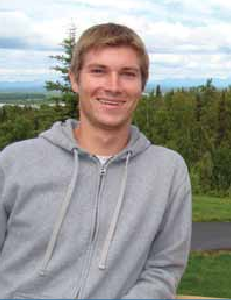Abraham Houben
 Abraham (Bram) Houben, an ICAR M.S. student, obtained his Bachelors at Laurea University of Applied Science in Finland. The University is centered in the competitive region of the Helsinki Metropolitan Area and strives to strengthen international networks outside Northern Europe. Since the school is heavily focused on international cooperation, it is no surprise that Bram chose to continue his studies in conflict analysis and resolution. Studying in Finland, Holland, China, and Chile expanded Bram's perspective of conflict and he decided to increase his knowledge by heading to the U.S. ICAR filled a void; Bram says that the institution "offered a depth of courses and support that I didn't find anywhere else." At ICAR, Bram can pursue his previous work which focused on the difficulties faced by Somali and Southeast-Asian peoples as they transitioned to Helsinki and assimilated into the new culture.
Abraham (Bram) Houben, an ICAR M.S. student, obtained his Bachelors at Laurea University of Applied Science in Finland. The University is centered in the competitive region of the Helsinki Metropolitan Area and strives to strengthen international networks outside Northern Europe. Since the school is heavily focused on international cooperation, it is no surprise that Bram chose to continue his studies in conflict analysis and resolution. Studying in Finland, Holland, China, and Chile expanded Bram's perspective of conflict and he decided to increase his knowledge by heading to the U.S. ICAR filled a void; Bram says that the institution "offered a depth of courses and support that I didn't find anywhere else." At ICAR, Bram can pursue his previous work which focused on the difficulties faced by Somali and Southeast-Asian peoples as they transitioned to Helsinki and assimilated into the new culture.
Bram's other passions include youth issues. After spending an extensive amount of time in the Caucasus and former Soviet states, Bram is particularly interested in how children from these regions are impacted by internal displacement. In effort to acknowledge the youth narrative, Bram helped to organize conferences focused on increasing dialogue between conflicting countries throughout the European Union. His work with youth was deeply enriching. Says Bram, "These programs were enlightening and seeing young people engaging in such depth of dialogue was encouraging."
After he graduates from ICAR, Bram hopes to partake in international work which allows him to get involved directly with people experiencing conflict. When asked if ICAR is sufficiently addressing all areas of conflict, Bram acknowledged that there are a lot of "forgotten" conflicts in the world which do not get a lot of international media attention, especially in the U.S. He believes that the media in the U.S. is focused too much on domestic issues and does not offer as much information on international disputes as it should. In light of this, however, Bram hopes that he, along with his colleagues, "can not only revive attention to forgotten conflicts, but be a part of their resolution as well."




